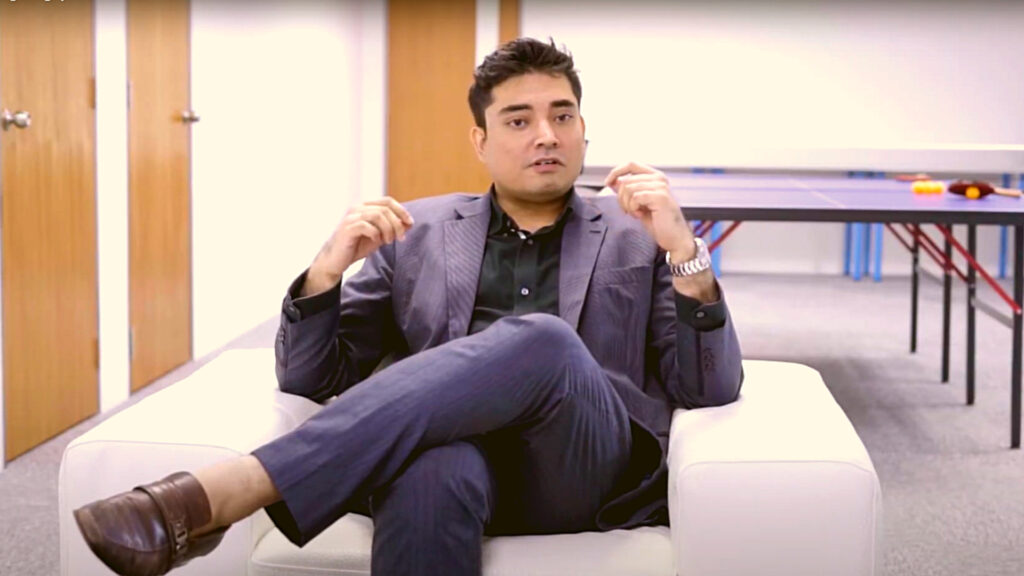In today’s fast-paced world, memory plays a crucial role in our everyday lives. From remembering important tasks to learning new skills, having a good memory can be the key to success. That’s where memory experts and coaches like Sancy Suraj come in. Based in Singapore, Sancy is a renowned memory athlete with over 12 years of experience in training memory techniques. He has set six memory records and has trained over 10,000 people worldwide. In this article, we will delve into Sancy’s journey as a memory expert, his coaching and training methods, and his thoughts on the future of memory techniques and innovations.

What motivated you to become a memory expert and coach, and how did you get started in this field?
As a child, I was always fascinated by the power of memory. I was particularly intrigued by how some people could easily remember vast amounts of information, while others struggled with even basic memory tasks. This fascination motivated me to learn more about memory and how it works. I began studying memory techniques and experimenting with different strategies to see what worked best for me. As I continued to learn and practice, I started to realize that memory improvement was not only possible, but also a skill that could be developed and honed with practice.
After realizing the potential of memory improvement, I decided to share my knowledge with others. I started teaching memory techniques to my friends and family, and soon realized that there was a high demand for this kind of training. I decided to make memory training my career and began teaching memory techniques to people around the world. It has been 12 years since I started training people in memory techniques, and it has been an incredibly fulfilling journey.
The techniques I teach vary depending on the individual’s learning style and the nature of the information they are trying to remember. However, some of the most effective memory techniques I teach include visualization, association, and mnemonics. Visualization involves creating vivid mental images to remember information, while association involves linking new information with pre-existing knowledge. Mnemonics involve using memory aids, such as acronyms or rhymes, to help remember information. These techniques can be applied in a variety of settings, including education, business, and personal life.
Overall, my goal is to help individuals develop their memory skills to unlock their full potential. I believe that everyone has the ability to improve their memory and I strive to create a customized training program that is tailored to their unique learning style and needs. By doing so, I hope to inspire people to achieve their goals and realize their full potential.
Can you walk us through some of the most effective memory techniques that you teach to your clients, and how they can be applied in different situations?
Sure, I would be happy to walk you through some of the most effective memory techniques that I teach to my clients.
One of the most powerful techniques is called the “method of loci” or “memory palace” technique. This involves mentally placing information you want to remember in specific locations along a familiar route or location, such as your house or a street you walk along every day. This technique taps into the power of spatial memory and makes it easier to recall information by mentally walking through the locations in your mind.
Another technique I teach is called the “peg system”, where you associate items you want to remember with pre-existing words, numbers or images. For instance, you can associate numbers with rhyming words that sound similar to the number, like “one” with “sun” or “two” with “shoe”. You can then use these pegs to help remember other information, like a list of items or dates.
Association is another technique that can be particularly helpful for remembering names and faces. By associating someone’s name with an image that reminds you of them, such as “Mike” with a microphone, you can create a powerful mental link between the person and their name.
Visualization is another technique that can be used to remember information. By creating vivid mental images, you can make information more memorable and easier to recall. For instance, if you need to remember a phone number, you can visualize the numbers as different objects and create a story around them that makes them more memorable.
Overall, these techniques can be applied in a variety of situations and can help individuals remember information more effectively. By customizing the techniques to each individual’s learning style and preferences, I aim to help them achieve their memory goals and unlock their full potential.
You’ve set six memory records over the course of your career. Can you tell us about one of your most memorable record-breaking moments, and what it took to achieve it?
One of my most memorable record-breaking moments was when I set the world record for the “Memorizing a Deck of Cards” event at the 2014 World Memory Championships. This involved memorizing a shuffled deck of 52 cards in the fastest time possible.
To achieve this record, I used a technique called the “Dominic System”, which involves associating every card with a person, action, or object that starts with the same letter as the card. For instance, the Queen of Hearts might be associated with “Quentin Tarantino” and the Ace of Spades with “Arnold Schwarzenegger”. By creating strong associations between each card and its corresponding image, I was able to quickly recall the order of the entire deck.
The moment when I broke the world record was incredibly exciting and fulfilling, as I had put in months of training and preparation leading up to the competition. It was a testament to the power of memory techniques and the incredible potential of the human mind.
However, I don’t believe that breaking records is the ultimate goal of memory training. Rather, it’s about unlocking the full potential of our minds and improving our ability to remember important information in our personal and professional lives. Memory techniques can be applied to a wide range of tasks, from studying for exams to remembering important dates and appointments, and can ultimately help us lead more productive and fulfilling lives.
“Memory techniques are not just about breaking records, but unlocking the full potential of our minds and improving our ability to remember important information in our personal and professional lives.”
How do you adapt your coaching and training methods to different individuals, based on their unique learning styles and memory strengths and weaknesses?
When it comes to adapting my coaching and training methods to different individuals, I take into account their unique learning styles and memory strengths and weaknesses.
Some people may be more visual learners and prefer to use visualization techniques to remember information, while others may prefer to use verbal or auditory cues. By understanding the individual’s learning style, I can customize the techniques and strategies I teach to maximize their effectiveness.
Additionally, I also take into account the individual’s memory strengths and weaknesses. Some people may struggle with remembering names and faces, while others may struggle with memorizing lists or sequences of information. By identifying these areas of weakness, I can focus on developing specific techniques and strategies to improve their performance in these areas.
It’s also important to recognize that everyone’s memory capacity is different. Some individuals may have naturally better memories than others, while others may struggle with memory-related issues such as ADHD or dyslexia. In such cases, I work closely with individuals to help them overcome these challenges and develop effective memory techniques that work for them.
Ultimately, my goal is to provide each individual with the tools and strategies they need to improve their memory skills and unlock their full potential. By tailoring my coaching and training methods to their unique needs, I aim to help them achieve success in both their personal and professional lives.
What role does physical fitness play in memory improvement, and how do you incorporate athletics into your training regimen?
Physical fitness can play a significant role in memory improvement. Research has shown that regular exercise can help to increase the size of the hippocampus, a region of the brain that is crucial for learning and memory. Exercise can also help to improve blood flow to the brain, which can increase the delivery of oxygen and nutrients to brain cells.
As a memory expert, I incorporate athletics into my training regimen by encouraging my clients to engage in regular physical activity. This could include anything from going for a walk or jog, to playing sports or participating in a fitness class. By making physical activity a regular part of their routine, my clients can help to support their brain health and improve their memory performance.
Another way that physical fitness can be incorporated into memory training is through memory games and exercises that involve movement. For example, memory games that involve physical actions, such as jumping jacks or squat thrusts, can help to engage both the body and mind, which can lead to better memory retention.
It’s important to note that while physical fitness can be beneficial for memory improvement, it’s not a substitute for specific memory training techniques. Memory techniques such as visualization, association, and repetition are still crucial for developing and improving memory skills. However, incorporating physical fitness into a memory training regimen can help to support overall brain health and enhance the effectiveness of memory training techniques.
“Physical fitness and memory training go hand in hand, as regular exercise can help to support brain health and enhance the effectiveness of memory techniques. By incorporating physical activity into our routine, we can unlock the full potential of our minds and improve our ability to remember important information in our personal and professional lives.”
Sancy Suraj’s journey as a memory expert began over a decade ago, and he has never looked back since. He was initially drawn to memory techniques as a way to improve his own learning and recall abilities, but he soon realized the potential to help others as well. Through years of practice and dedication, he has become one of the most sought-after memory coaches in the world.
Sancy’s coaching and training methods are based on a variety of memory techniques, including mnemonics, visualization, and association. He teaches his clients how to use these techniques to remember everything from names and faces to long lists of information. One of the most effective techniques he teaches is the “Memory Palace,” which involves associating information with different locations in a familiar place, such as a house or a street. This technique has been used for centuries and is still highly effective today.
Sancy has achieved many record-breaking moments throughout his career, but one of his most memorable experiences was setting a new Asian record for memorizing a deck of cards in just over 17 seconds. To achieve this feat, he used a combination of visualization and association techniques. It takes immense focus, dedication, and practice to achieve such a feat, and Sancy’s success is a testament to his hard work and expertise.

You’ve trained over 10,000 people worldwide in memory techniques. Can you tell us about a particularly successful coaching experience, and what made it successful?
I’ve had many successful coaching experiences over the years, but one that stands out to me was when I worked with a college student who was struggling with remembering course material for exams. The student had previously been diagnosed with ADHD and was having difficulty retaining information, even after multiple attempts to study the material.
During our coaching sessions, I worked with the student to identify their unique learning style and memory strengths and weaknesses. We focused on developing specific memory techniques that would work for them, such as visualization and association strategies. I also incorporated physical movement into our sessions to help keep the student engaged and focused.
Through consistent practice and reinforcement, the student was able to improve their memory skills significantly. They reported feeling more confident and prepared for exams, and their grades improved as a result. This success was a testament to the power of personalized coaching and the effectiveness of memory techniques when tailored to an individual’s unique needs.
One of the keys to this successful coaching experience was my ability to establish a strong rapport with the student and understand their specific challenges and goals. By taking the time to get to know the student and their unique situation, I was able to develop a customized coaching plan that was tailored to their specific needs. This allowed us to work together as a team and achieve significant improvements in memory performance.
Overall, this coaching experience was a reminder of the impact that memory training can have on an individual’s academic and professional success. By developing effective memory techniques and strategies, individuals can unlock their full potential and achieve their goals.
You represented Singapore at the World Memory Championships in 2011. Can you tell us about that experience and how it influenced your career as a memory expert?
Representing Singapore at the World Memory Championships in 2011 was an incredible experience and a significant milestone in my career as a memory expert. The competition was held in Guangzhou, China, and featured some of the best memory athletes from around the world.
As a first-time competitor, I was both excited and nervous to compete against such skilled opponents. The competition consisted of several memory tasks, such as memorizing decks of cards, random numbers, and names and faces. I was able to perform well in these tasks, and ultimately finished in 16th place overall.
While I didn’t place in the top tier of competitors, the experience taught me a great deal about memory training and the importance of mental preparation. Competing at the World Memory Championships required an immense amount of focus, discipline, and determination. It also highlighted the potential of memory training to improve cognitive performance and achieve extraordinary feats.
Since the competition, I have continued to work on refining my memory techniques and training methods. I’ve also had the opportunity to share my experience with others and encourage more people to explore the world of memory training and competitions. Overall, the World Memory Championships was a defining moment in my career and a testament to the power of memory training to transform lives.
How do you stay up-to-date with the latest research and developments in the field of memory improvement, and incorporate them into your coaching and training methods?
As a memory expert and coach, it is essential to stay up-to-date with the latest research and developments in the field of memory improvement. This involves regularly reviewing academic journals, attending conferences, and engaging with other memory experts and researchers.
One of the primary ways I stay informed is by reading peer-reviewed publications in the field of cognitive psychology and neuroscience. This allows me to stay abreast of the latest findings on topics such as memory encoding and retrieval, working memory capacity, and attentional control. By staying informed about the latest research, I am better able to develop and refine my training methods and adapt them to my clients’ unique needs.
Another important aspect of staying up-to-date involves attending conferences and workshops focused on memory improvement. These events provide a great opportunity to network with other experts in the field, learn about new memory training techniques, and gain insights into the latest research findings. They also offer a chance to share my own experiences and knowledge with others in the field, which can help to promote collaboration and advance the science of memory improvement.
Finally, I also engage with other memory experts and coaches through online communities and social media platforms. This allows me to stay connected with others in the field, share ideas and strategies, and stay informed about emerging trends and developments in memory training. By remaining engaged with the wider memory community, I can continue to refine my own techniques and methods and offer the most effective training to my clients.
What advice would you give to someone who wants to improve their memory skills, but doesn’t know where to start?
Improving memory skills can seem daunting, but there are many techniques and strategies that anyone can use to boost their memory capacity. The first step is to understand that memory is a skill that can be trained and improved, rather than an innate ability that is set in stone. With dedication and practice, anyone can develop a better memory.
One of the most effective ways to improve memory is through the use of mnemonic devices. These are memory aids that can help you remember information more easily by associating it with visual or verbal cues. For example, you might create an acronym to help you remember a list of items or use a memory palace technique to associate information with specific locations in a familiar environment.
Another key strategy is to practice active recall. This involves actively retrieving information from memory, rather than simply re-reading or reviewing it. For example, you might try to recall the key points of an article or lecture after reading or listening to it, rather than simply reviewing your notes.
It’s also important to focus on developing good study habits, such as breaking information down into smaller chunks, using spaced repetition to reinforce learning, and minimizing distractions during study sessions.
Finally, maintaining good physical and mental health is also crucial for optimal memory function. This includes getting enough sleep, exercising regularly, eating a healthy diet, and managing stress levels. All of these factors can contribute to improved memory performance.
In summary, improving memory skills is a matter of developing good habits and strategies, such as using mnemonic devices, practicing active recall, and maintaining good physical and mental health. By taking a deliberate and focused approach to memory training, anyone can improve their memory capacity and achieve their learning and performance goals.
Looking to the future, what new memory techniques or innovations do you think will emerge in the coming years, and how will you incorporate them into your work as a memory expert?
As a memory expert, I believe that memory techniques and innovations will continue to evolve and improve in the coming years. One area of particular interest is the development of digital memory aids and brain-computer interfaces that can help individuals with memory impairments or disabilities.
For example, there are already a variety of apps and software programs available that use memory training exercises and games to help users improve their memory capacity. In addition, there are emerging technologies that use brain-computer interfaces to help individuals with memory impairments access and recall information more easily.
Another area of innovation is in the field of neuroplasticity, which refers to the brain’s ability to adapt and change over time. By understanding how the brain processes and stores information, researchers are developing new techniques and strategies for improving memory and enhancing learning outcomes.
Overall, I believe that the future of memory techniques and innovations is very exciting, and I look forward to incorporating these new developments into my coaching and training methods. By staying up-to-date with the latest research and technologies, I am confident that I can continue to help individuals unlock their memory potential and achieve their goals.
“Advancements in memory techniques and technologies offer limitless possibilities for unlocking the full potential of the human mind. By embracing innovation and staying ahead of the curve, we can continue to enhance our memory skills and achieve new levels of success and fulfillment.”
In conclusion, Sancy Suraj is a remarkable memory expert and coach who has dedicated his career to helping others unlock their memory potential. With his extensive knowledge and experience, he has trained thousands of people worldwide in memory techniques that can be applied to various aspects of life. As the world continues to evolve, memory techniques and innovations will only become more important, and Sancy Suraj is at the forefront of this exciting field.
















